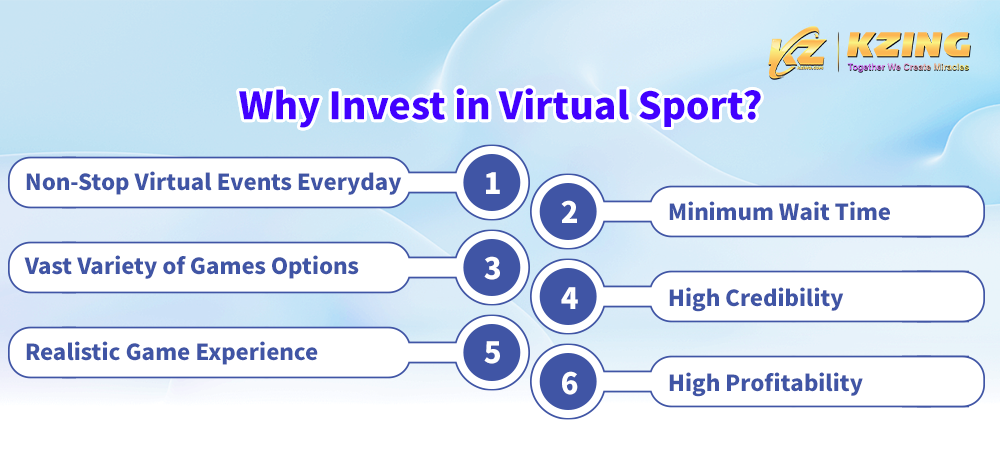

In recent years, virtual sports betting has emerged as a revolutionary segment within the broader gambling industry. Combining advanced computer-simulated sporting events with betting opportunities, virtual sports have captured the attention of both players and operators. But what makes virtual sports so compelling, and why are they quickly becoming a reliable revenue stream in the competitive world of gambling? Let’s dive into this cutting-edge betting phenomenon with Kzing.
Table of Contents
What Is Virtual Sports Betting?
At its core, virtual sports betting revolves around placing bets on computer-generated simulations of sports events. These simulations are created using algorithms, which in turn are powered by a Random Number Generator (RNG) to ensure fairness and unpredictability. The concept is similar to slot machines in casinos, where RNGs determine each outcome without any bias or external influence.
In virtual sports, the simulated events can either be based on real-life sports teams and events or feature entirely fictional players. However, the sports themselves mimic real sports such as football, basketball, horse racing, and auto racing. Through the use of highly realistic 3D graphics, animations, and motion-capture technology, virtual sports closely resemble their real-world counterparts, offering an immersive and thrilling experience to players.
How Do Virtual Sports Work?
In practice, virtual sports betting works much like traditional sports betting. Players can place wagers on a variety of virtual competitions such as horse racing, football, tennis, and more. The types of bets available are also familiar: predicting the final winner, the total score, over/under results, player rankings, and even multi-leg bets.
Each virtual sport features its own set of betting odds. For instance, in a virtual football match:
Odds for Team A: -150 (decimal odds: 1.67)
Odds for Team B: +140 (decimal odds: 2.40)
Draw: -105 (decimal odds: 1.95)
However, unlike traditional sports, these odds are not influenced by the performance of any specific team, athlete, or animal, as outcomes are determined solely by RNGs. This means that even a star player in one virtual match may perform poorly in another, resulting in unpredictable outcomes that are more pronounced than in real sports. This inherent unpredictability adds an additional layer of excitement for players while ensuring that the odds remain consistent and fair across virtual events.
What Sets Virtual Sports Apart?
Here is why integrating virtual sports betting into your platform can maximize your revenue all year long.
1. Consistent Availability and Revenue
One of the key advantages of virtual sports for operators is their immunity to real-world disruptions like weather conditions, cancellations, or off-seasons. Whether it is global pandemic or the traditional seasonal breaks in live sports, virtual sports continue unaffected, providing constant betting opportunities. Unlike traditional sports, which adhere to specific schedules, virtual sports are available 24/7, 365 days a year, ensuring that players always have something to bet on. Whether it is football, basketball, horse racing, or greyhound racing, these simulated events run every few minutes, keeping platforms active and engaging for players.
This uninterrupted action helps boost user participation, driving revenue, especially during periods of downtime or when major live sports are not taking place. By offering continuous betting opportunities, operators can maintain engagement and ensure a consistent flow of income, regardless of external circumstances.
2. Low Maintenance with High Profit Potential
Virtual sports are powered by sophisticated algorithms and RNGs that determine the outcomes. This makes them highly reliable and low-maintenance for operators. Since these games are virtual, there is no need for the complex logistics that come with live sporting events, such as broadcasting rights, real-world scheduling, or team management. Once the virtual sports software is integrated into your platform, it requires minimal upkeep while offering high revenue potential due to its year-round availability and fast-paced nature.
Additionally, virtual sports transcend geographical boundaries, making them a valuable tool for attracting international players. The flexibility to tailor virtual sports offerings to specific markets—such as featuring sports that are particularly popular in certain regions—enables operators to target diverse audiences more effectively. This adaptability helps maximize revenue from different player segments around the world, making virtual sports an ideal addition to any betting platform looking to scale globally.
3. A Seamless User Experience
Most betting platforms have seamlessly integrated virtual sports into the same interface as traditional sports betting, making it easy for users to transition between the two. This integration offers a powerful cross-selling opportunity for sports platforms, enabling them to market virtual sports to existing users who are already familiar with the platform. From the player’s perspective, the convenience of accessing both virtual and live sports betting in one place enhances their overall experience.
To further elevate this experience, operators utilize cutting-edge graphics, real-life physics, and motion-capture technology, creating virtual events that closely mimic actual sports matches. These visually engaging simulations heighten the excitement and thrill for players, making them more likely to return and engage with the platform regularly. The combination of convenience, realism, and entertainment keeps users invested, contributing to greater player retention and loyalty.
4. Variety of Sports and Betting Options
Virtual sports offer a diverse array of events, from simulated football matches to virtual horse racing, tennis, and even auto racing, catering to a wide range of bettors with different preferences. This variety allows operators to attract multiple demographics while maintaining the familiar betting options found in real-life sports, ensuring players can enjoy the same formats they are accustomed to, but with the added convenience of continuous gameplay.
Importantly, virtual sports do not have to replace traditional sports betting—they can complement it. For example, during major events like the World Cup or Super Bowl, virtual sports can serve as an additional layer of engagement, allowing bettors to place wagers between games. By offering both real and virtual sports betting, operators can appeal to diverse player interests and keep their platform lively and entertaining, no matter what’s happening in the real world. This dual offering enhances player retention and engagement, ensuring a dynamic and profitable experience year-round.

Get in touch with Kzing today to discover more about the Virtual Cockfighting Game.
5. Simplicity for Newcomers and Younger Players
Another key advantage of virtual sports betting is its simplicity, making it especially appealing to new and younger players. With fewer variables compared to live sports, virtual sports are easier to understand and participate in, as there is no need to analyze complex factors like player form, weather conditions, or team dynamics. Since the outcomes are determined by RNGs, the process becomes straightforward and accessible.
This simplicity, combined with the high-quality graphics and immersive experience, attracts younger, tech-savvy players who are familiar with video games and simulations. This demographic, more inclined to engage with digital platforms and place frequent bets, represents a valuable audience for operators looking to increase revenue. Furthermore, the appeal of virtual sports aligns with the growing trend of gamification in online gambling, which has been proven to enhance player engagement and retention, making virtual sports an essential tool for operators seeking to build a loyal user base.
Conclusion
In today’s fast-paced gambling landscape, virtual sports betting is a revolutionary force that empowers operators to maximize revenue and keep players engaged year-round. With 24/7 availability, minimal maintenance requirements, and a seamless user experience, virtual sports present a profitable and reliable alternative to traditional betting models.
Embracing this cutting-edge opportunity is not just a smart choice; it is a strategic move towards success in the competitive industry. By leveraging the advantages of virtual sports, operators can build thrilling platforms that captivate players and drive consistent profits. Ready to take your betting offerings to the next level? For more information about virtual sports and how Kzing can help you unlock their full potential, contact Kzing today!


![Dive into the Games Offered by White Label Providers DW_Article_3_Choose_a_White_Label_Provider_文章封面_en_400x250[1]](https://www.kzing.co/wp-content/uploads/2024/04/DW_Article_3_Choose_a_White_Label_Provider_文章封面_en_400x2501-150x150.png)






en-150x150.jpg)

